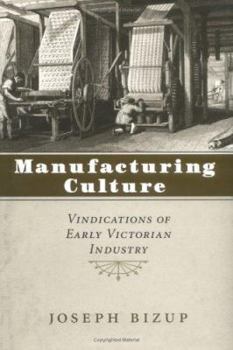Manufacturing Culture: Vindications of Early Victorian Industry
Select Format
Select Condition 
Book Overview
From Robert Southey to William Morris, British social critics in the Romantic tradition consistently stigmatized industry as a threat to aesthetic or humanistic "culture." Joseph Bizup argues that early Victorian advocates of industry sought to resist the power inherent in this opposition by portraying automatic manufacture itself as a cultural force or agent. He traces the contours of this new proindustrial rhetoric as it coalesced in two mutually reinforcing discourses: the contentious debate over the factory system and its social consequences that raged throughout the 1830s and 1840s, and the extensive discussions of the social and commercial benefits of good design that culminated in the Great Exhibition of 1851. Through careful readings of a diverse array of texts, including treatises on factories and machinery, medical studies of the working classes, theoretical discussions of the decorative arts, and lectures on the Great Exhibition, Bizup shows that liberal proponents of industry such as Andrew Ure, Charles Babbage, James Phillips Kay, and Henry Cole aestheticized manufacture by interpreting its concrete agents and products--whether they be factory operatives, systems of machinery, mass-produced copies, or elaborately crafted "art manufactures"--as emblems of a prior conceptual unity or beauty. They thus allied industry with culture by portraying industry as one realization of the organic ideal central to the idea of culture. Bizup concludes with an examination of John Ruskin's and William Morris's efforts to counter this sort of rhetorical maneuvering by treating cultured manliness as a figure for the cooperative impulse they both hoped would replace competitive self-interest as society's organizing value. By showing that culture could not be opposed to industry in any pure or absolute sense, Manufacturing Culture both enriches our understanding of the Victorian debates over industrialization and contributes greatly to the ongoing scholarly exploration of the complex genealogy of our modern concept of culture.
Format:Hardcover
Language:English
ISBN:0813922461
ISBN13:9780813922461
Release Date:December 2003
Publisher:University of Virginia Press
Length:256 Pages
Weight:1.12 lbs.
Dimensions:0.9" x 6.9" x 8.7"
Grade Range:Postsecondary and higher
Related Subjects
HistoryCustomer Reviews
0 rating





